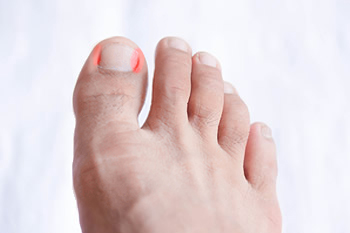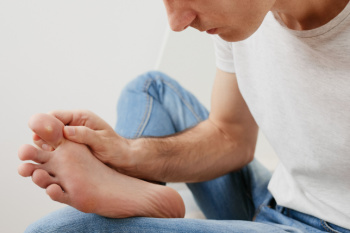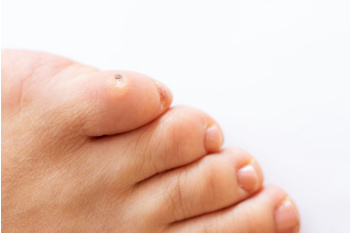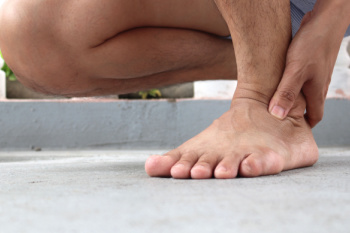
(908) 381-8160Berkeley Heights
 Besides pain and annoyance, ingrown toenails are also at risk of developing an infection, especially if left untreated. Redness, swelling, and increased pain surrounding an ingrown nail edge can all be signs of an infection. The toe could also become warm to the touch and emit discharge or pus where the ingrown toenail is, which are further indications of infection. Additionally, consistent discomfort or throbbing pain, even when not applying pressure to the toe, can suggest an infection. Ingrown toenail infections can escalate if left untreated, so it is important to treat them properly. If you suspect an infection caused by an ingrown toenail, it is suggested that you seek prompt treatment from a podiatrist.
Besides pain and annoyance, ingrown toenails are also at risk of developing an infection, especially if left untreated. Redness, swelling, and increased pain surrounding an ingrown nail edge can all be signs of an infection. The toe could also become warm to the touch and emit discharge or pus where the ingrown toenail is, which are further indications of infection. Additionally, consistent discomfort or throbbing pain, even when not applying pressure to the toe, can suggest an infection. Ingrown toenail infections can escalate if left untreated, so it is important to treat them properly. If you suspect an infection caused by an ingrown toenail, it is suggested that you seek prompt treatment from a podiatrist.
Ingrown toenails may initially present themselves as a minor discomfort, but they may progress into an infection in the skin without proper treatment. For more information about ingrown toenails, contact Dr. Janet Leicht of New Jersey. Our doctor can provide the care you need to keep you pain-free and on your feet.
Ingrown Toenails
Ingrown toenails are caused when the corner or side of a toenail grows into the soft flesh surrounding it. They often result in redness, swelling, pain, and in some cases, infection. This condition typically affects the big toe and may recur if it is not treated properly.
Causes
You are more likely to develop an ingrown toenail if you are obese, have diabetes, arthritis, or have any fungal infection in your nails. Additionally, people who have foot or toe deformities are at a higher risk of developing an ingrown toenail.
Symptoms
Some symptoms of ingrown toenails are redness, swelling, and pain. In rare cases, there may be a yellowish drainage coming from the nail.
Treatment
Ignoring an ingrown toenail can have serious complications. Infections of the nail border can progress to a deeper soft-tissue infection, which can then turn into a bone infection. You should always speak with your podiatrist if you suspect you have an ingrown toenail, especially if you have diabetes or poor circulation.
If you have any questions, please feel free to contact our office located in Berkeley Heights, NJ . We offer the newest diagnostic and treatment technologies for all your foot care needs.
 It can be frustrating to manage plantar warts that return after treatment. Plantar warts are a common foot condition that develop when the human papillomavirus, or HPV, infects the bottom of the foot. Plantar warts can come back because HPV can remain dormant in the skin even after visible warts are treated, making it possible for new warts to develop in the same spot or nearby. The skin tissue may also hold small, undetectable warts or viral particles in surrounding skin tissue, leading to more warts in the future. Additionally, a weakened immune system, exposure to HPV in communal areas, such as locker rooms or swimming pools, or incomplete removal of the wart during treatment can lead to recurrent plantar warts. To prevent plantar warts from coming back, it is suggested that you consult a podiatrist who can offer various treatments for the warts and minimize the chance of recurrence.
It can be frustrating to manage plantar warts that return after treatment. Plantar warts are a common foot condition that develop when the human papillomavirus, or HPV, infects the bottom of the foot. Plantar warts can come back because HPV can remain dormant in the skin even after visible warts are treated, making it possible for new warts to develop in the same spot or nearby. The skin tissue may also hold small, undetectable warts or viral particles in surrounding skin tissue, leading to more warts in the future. Additionally, a weakened immune system, exposure to HPV in communal areas, such as locker rooms or swimming pools, or incomplete removal of the wart during treatment can lead to recurrent plantar warts. To prevent plantar warts from coming back, it is suggested that you consult a podiatrist who can offer various treatments for the warts and minimize the chance of recurrence.
Plantar warts can be very uncomfortable. If you need your feet checked, contact Dr. Janet Leicht from New Jersey. Our doctor will assist you with all of your foot and ankle needs.
About Plantar Warts
Plantar warts are the result of HPV, or human papillomavirus, getting into open wounds on the feet. They are mostly found on the heels or balls of the feet.
While plantar warts are generally harmless, those experiencing excessive pain or those suffering from diabetes or a compromised immune system require immediate medical care. Plantar warts are easily diagnosed, usually through scraping off a bit of rough skin or by getting a biopsy.
Symptoms
Treatment
To help prevent developing plantar warts, avoid walking barefoot over abrasive surfaces that can cause cuts or wounds for HPV to get into. Avoiding direct contact with other warts, as well as not picking or rubbing existing warts, can help prevent the further spread of plantar warts. However, if you think you have developed plantar warts, speak to your podiatrist. He or she can diagnose the warts on your feet and recommend the appropriate treatment options.
If you have any questions please feel free to contact our office located in Berkeley Heights, NJ . We offer the newest diagnostic and treatment technologies for all your foot and ankle needs.

Corns on the feet are thick, hardened skin bumps that typically form on bony areas, such as on the top or sides of the toes, due to friction and pressure. The three types of corns are hard corns on toe tops, soft corns between toes, and seed corns on the soles of the feet. Foot corns develop due to wearing ill-fitted shoes, either too tight or too loose, causing rubbing and pressure. Improperly fitting socks or not wearing any socks can also lead to friction. Individuals with conditions like arthritis, bunions, or hammertoes are at higher risk. Preventing foot corns involves wearing well-fitting, comfortable shoes, avoiding high heels or pointy-toed shoes, and using corn pads for added protection. Moisture-wicking socks may help to reduce friction. If you have foot corns that are causing you discomfort or showing signs of infection, it is suggested that you consult a podiatrist for an examination and proper treatment or removal.
Corns can make walking very painful and should be treated immediately. If you have questions regarding your feet and ankles, contact Dr. Janet Leicht of New Jersey. Our doctor will treat your foot and ankle needs.
Corns: What Are They? And How Do You Get Rid of Them?
Corns are thickened areas on the skin that can become painful. They are caused by excessive pressure and friction on the skin. Corns press into the deeper layers of the skin and are usually round in shape.
Ways to Prevent Corns
There are many ways to get rid of painful corns such as:
Treating Corns
Although most corns slowly disappear when the friction or pressure stops, this isn’t always the case. Consult with your podiatrist to determine the best treatment option for your case of corns.
If you have any questions please feel free to contact our office located in Berkeley Heights, NJ . We offer the newest diagnostic and treatment technologies for all your foot and ankle needs.

Peripheral neuropathy can lead to significant medical complications, particularly affecting the feet, heart, and circulation. Diabetic polyneuropathy, a common variant, often results in diabetic foot ulcers, slow-healing skin wounds or sores, primarily due to reduced foot sensation, making injuries more likely. Elevated blood sugar levels can damage blood vessels, impairing foot blood supply and healing, sometimes progressing to gangrene. When infections in neuropathic feet worsen, they may require surgery to remove damaged tissue and antibiotic treatment. If you have peripheral neuropathy, and especially if you also have diabetes, it is strongly suggested that you schedule regular appointments with a podiatrist for ongoing treatment. Diagnosing problems as early as possible may help to prevent serious complications of peripheral neuropathy.
Neuropathy
Neuropathy can be a potentially serious condition, especially if it is left undiagnosed. If you have any concerns that you may be experiencing nerve loss in your feet, consult with Dr. Janet Leicht from New Jersey. Our doctor will assess your condition and provide you with quality foot and ankle treatment for neuropathy.
What Is Neuropathy?
Neuropathy is a condition that leads to damage to the nerves in the body. Peripheral neuropathy, or neuropathy that affects your peripheral nervous system, usually occurs in the feet. Neuropathy can be triggered by a number of different causes. Such causes include diabetes, infections, cancers, disorders, and toxic substances.
Symptoms of Neuropathy Include:
Those with diabetes are at serious risk due to being unable to feel an ulcer on their feet. Diabetics usually also suffer from poor blood circulation. This can lead to the wound not healing, infections occurring, and the limb may have to be amputated.
Treatment
To treat neuropathy in the foot, podiatrists will first diagnose the cause of the neuropathy. Figuring out the underlying cause of the neuropathy will allow the podiatrist to prescribe the best treatment, whether it be caused by diabetes, toxic substance exposure, infection, etc. If the nerve has not died, then it’s possible that sensation may be able to return to the foot.
Pain medication may be issued for pain. Electrical nerve stimulation can be used to stimulate nerves. If the neuropathy is caused from pressure on the nerves, then surgery may be necessary.
If you have any questions, please feel free to contact our office located in Berkeley Heights, NJ . We offer the newest diagnostic and treatment technologies for all your foot care needs.